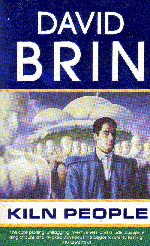|
Kiln People
Copyright 2002 by
I first read this on the 17th April 2002. In the near future, we'll be able to construct copies of ourselves from nanotechnologically-enhanced clay. These dittos survive only a single day, but they can be created rapidly and sent off to do the dirty, dangerous or uninteresting work. The dittos are conscious, are fully aware that their consciousness has been transferred into the clay body, but are willing nonetheless to dedicate their brief lives to support the original, the real individual, even where their memories cannot be passed on. Albert Morris is a private investigator. He's been involved in many difficult jobs. He's often sent his dittos out to do dangerous jobs in dubious places knowing that they may be harmed or indeed, may be unable to return. Currently he's working on missing person's case, that of Dr Yosil Maharal, co-founder of Universal Kilns, the major ditto maker. Helping him is Ritu Maharal, the Doctor's daughter. Helping also, or perhaps hindering him, is Aeneas Kaolin, the other co-founder of UK. But now someone is out to get him, to permanently kill the real Albert Morris not just the dittos. They've even attacked his house with a missile. It's a desperate race for the surviving dittos to unravel the mystery before the day ends and their time is up. This a good but unusual book. Brin has created a brilliant variation on good old-fashioned cloning. I would have loved a serious SF thriller exploring these great ideas. However, I was less satisfied with this satirical, farcical (in the theatrical sense) and occasionally careless novel. I found it difficult to take the serious parts of the story seriously when I was still agog at the basic premise: mining clay beds for the correct quality of clay? Oh come on! Embedding little nanotechnological components in clay? Give me a break! Wrapping them in clingfilm for storage? Baking them? Kaolin? Mad scientists? Very odd stuff. Well done to the Green ditto, I say, at least he had some commitment. Of course Brin is quite right in the point he is making: we're happy to eschew normal rights for a subject we consider less than human, and the subject itself will most likely go along along with this. So in that sense it was a good book delivering an important lesson. Interestingly Brin included a dedication to Greg Bear (amongst others). I believe Brin is slowly metamorphosing into Greg Bear. I cannot see any other reason for the inclusion of a vast, universe-encompassing ending. Loaded on the 1st July 2003.
|
|






